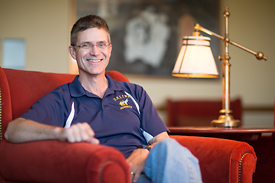Being a self-proclaimed contrarian has caused Allan Stam to find himself in tight spots on occasion, but it also has helped develop his intellectual interests and studies.
“My basic personal instinct is to say, ‘OK, this is what everyone believes but it can’t always be true. Say these people are wrong, then what would that mean?’” asks Stam, professor of political science, LSA, and director of the International Policy Center.

Photo by Austin Thomason, Michigan Photography.
Stam tries to bring this mindset into the classes he teaches at the Gerald R. Ford School of Public Policy, as well as into the meetings of the various committees he serves on.
Originally, Stam challenged the beliefs of his professors at Cornell University regarding war. “I took classes where my professors said we didn’t have to worry about nuclear deterrence because our strategic nuclear weapons deter their strategic nuclear weapons and no one would be crazy enough to use tactical nuclear weapons,” he says.
But Stam realized this was not necessarily true, after spending time in the U.S. Army as a communications specialist on a Special Forces A-team. “The team trained for reconnaissance operations in the Soviet Union and Eastern Europe in case there was a war with the Soviet Union,” says Stam, who also spent 15 years in the Army Reserve as an armor officer after going back to college.
Ask Allan Stam
What moment in the classroom stands out as the most memorable?
When a student’s question shows they’ve moved from “What are you talking about?” to “Ahhh, but if X is true, what does that mean for Y?”
What can’t you live without?
Family, close friends and music.
What is your favorite spot on campus?
Michigan Stadium in the fall, the sixth green at Radrick Farms in the spring and summer, Hill Auditorium during the winter.
What inspires you?
Excellence in most anything.
What are you currently reading?
“The Princes in the Tower,” by Allison Weir.
Who had the greatest influence on your career path?
My parents and Bruce Russett, a professor at Yale University who provided me with my first big break.
With this team, Stam was given a significant amount of responsibility. Working with the Air Force, his team would have provided targeting information for tactical nuclear weapons intended to destroy Soviet reserve forces in the event of a war. These experiences led him graduate school and eventually to his current project studying political leaders who engage in risky foreign policies. “We’re working on how to measure the level of … restraint and constraint that political leaders, presidents and dictators have,” he says. Gathering data on more than 2,000 political chief executives since 1870, Stam and colleagues have created a carefully structured biography of each individual looking specifically for formative events including service in the military, participation in combat or a revolutionary movement, or the death of a parent or sibling.
After coding these experiences for each individual leader, Stam found strong correlations between the use of violence against neighboring states with certain traumatic experiences. Although most people never turn to violence, there are some individuals who believe it is the best solution to many problems and some of these people end up running entire countries. “It turns out that the willingness to use violence is partly innate, and also partly experiential,” Stam says.
After 10 years, Stam finally is finishing up his study on leadership.
“We’re hoping that this will be a revolutionary, bold way to show how to study international politics with new tools,” Stam says.
The weekly Spotlight features faculty and staff members at the university. To nominate a candidate, please contact the Record staff at [email protected].

